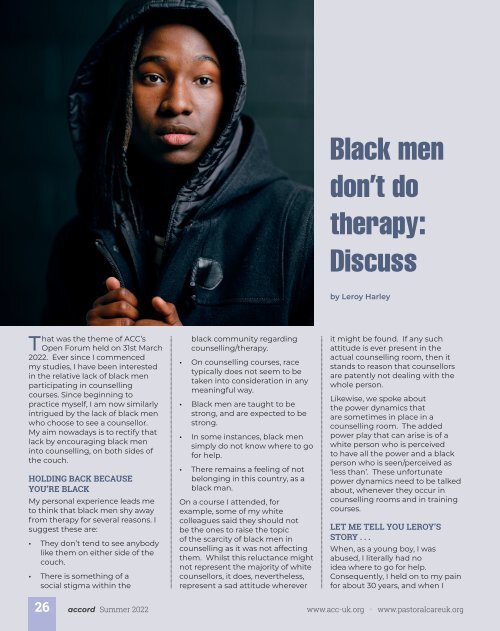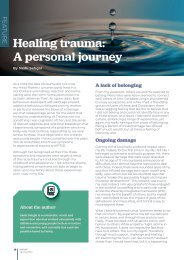ACC E-Accord Summer 2022
You also want an ePaper? Increase the reach of your titles
YUMPU automatically turns print PDFs into web optimized ePapers that Google loves.
Black men<br />
don’t do<br />
therapy:<br />
Discuss<br />
by Leroy Harley<br />
That was the theme of <strong>ACC</strong>’s<br />
Open Forum held on 31st March<br />
<strong>2022</strong>. Ever since I commenced<br />
my studies, I have been interested<br />
in the relative lack of black men<br />
participating in counselling<br />
courses. Since beginning to<br />
practice myself, I am now similarly<br />
intrigued by the lack of black men<br />
who choose to see a counsellor.<br />
My aim nowadays is to rectify that<br />
lack by encouraging black men<br />
into counselling, on both sides of<br />
the couch.<br />
HOLDING BACK BECAUSE<br />
YOU’RE BLACK<br />
My personal experience leads me<br />
to think that black men shy away<br />
from therapy for several reasons. I<br />
suggest these are:<br />
• They don’t tend to see anybody<br />
like them on either side of the<br />
couch.<br />
• There is something of a<br />
social stigma within the<br />
black community regarding<br />
counselling/therapy.<br />
• On counselling courses, race<br />
typically does not seem to be<br />
taken into consideration in any<br />
meaningful way.<br />
• Black men are taught to be<br />
strong, and are expected to be<br />
strong.<br />
• In some instances, black men<br />
simply do not know where to go<br />
for help.<br />
• There remains a feeling of not<br />
belonging in this country, as a<br />
black man.<br />
On a course I attended, for<br />
example, some of my white<br />
colleagues said they should not<br />
be the ones to raise the topic<br />
of the scarcity of black men in<br />
counselling as it was not affecting<br />
them. Whilst this reluctance might<br />
not represent the majority of white<br />
counsellors, it does, nevertheless,<br />
represent a sad attitude wherever<br />
it might be found. If any such<br />
attitude is ever present in the<br />
actual counselling room, then it<br />
stands to reason that counsellors<br />
are patently not dealing with the<br />
whole person.<br />
Likewise, we spoke about<br />
the power dynamics that<br />
are sometimes in place in a<br />
counselling room. The added<br />
power play that can arise is of a<br />
white person who is perceived<br />
to have all the power and a black<br />
person who is seen/perceived as<br />
‘less than’. These unfortunate<br />
power dynamics need to be talked<br />
about, whenever they occur in<br />
counselling rooms and in training<br />
courses.<br />
LET ME TELL YOU LEROY’S<br />
STORY . . .<br />
When, as a young boy, I was<br />
abused, I literally had no<br />
idea where to go for help.<br />
Consequently, I held on to my pain<br />
for about 30 years, and when I<br />
26 accord <strong>Summer</strong> <strong>2022</strong> www.acc-uk.org • www.pastoralcareuk.org



